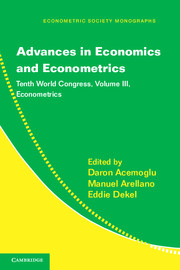Book contents
- Frontmatter
- Contents
- Contributors
- Preface
- I ECONOMETRICS OF INDUSTRIAL ORGANIZATION
- II MACROECONOMETRICS
- III ECONOMETRIC THEORY
- IV EMPIRICAL MICROECONOMICS
- V TIME SERIES AND PANELS
- 12 Panel Data Models and Factor Analysis
- 13 Penalized Sieve Estimation and Inference of Seminonparametric Dynamic Models: A Selective Review
- VI MIRRLEES REVIEW: RETHINKING THE TAX SYSTEM FOR THE TWENTY-FIRST CENTURY
- Name Index
- Miscellaneous Endmatter
13 - Penalized Sieve Estimation and Inference of Seminonparametric Dynamic Models: A Selective Review
Published online by Cambridge University Press: 05 May 2013
- Frontmatter
- Contents
- Contributors
- Preface
- I ECONOMETRICS OF INDUSTRIAL ORGANIZATION
- II MACROECONOMETRICS
- III ECONOMETRIC THEORY
- IV EMPIRICAL MICROECONOMICS
- V TIME SERIES AND PANELS
- 12 Panel Data Models and Factor Analysis
- 13 Penalized Sieve Estimation and Inference of Seminonparametric Dynamic Models: A Selective Review
- VI MIRRLEES REVIEW: RETHINKING THE TAX SYSTEM FOR THE TWENTY-FIRST CENTURY
- Name Index
- Miscellaneous Endmatter
Summary
Introduction
In this chapter, we review recent developments in large-sample theory for estimation of and inference on seminonparametric time-series models via the method of penalized sieves. To avoid confusion, we use the same terminology as in Chen (2007). An econometric (or statistical) model is a family of probability distributions indexed by unknown parameters. We call a model parametric if all of its unknown parameters belong to finite-dimensional Euclidean spaces. We call a model nonparametric if all of its unknown parameters belong to infinite-dimensional function spaces. Amodel is semiparametric if its parameters of interest belong to finite-dimensional spaces but its nuisance parameters are in infinite-dimensional spaces. Finally, a model is seminonparametric if it contains both finite-dimensional and infinite-dimensional unknown parameters of interest.
Seminonparametric models and methods have become popular in much theoretical and empirical work in economics. This is partly because it often is the case that economic theory suggests neither parametric functional relationships among economic variables nor particular parametric forms for error distributions. Another reason for the rising popularity of semi-nonparametric models is rapidly declining costs of collecting and analyzing large datasets. The seminonparametric approach is very flexible in economic structural modeling and policy and welfare analysis. Compared to parametric and semiparametric approaches, seminonparametrics are more robust to functional-form misspecification and are better able to discover nonlinear economic relations. Compared to fully nonparametric methods, seminon-parametrics suffer less from the “curse of dimensionality” and allow for more accurate estimation of structural parameters of interest.
- Type
- Chapter
- Information
- Advances in Economics and EconometricsTenth World Congress, pp. 485 - 544Publisher: Cambridge University PressPrint publication year: 2013
- 7
- Cited by

